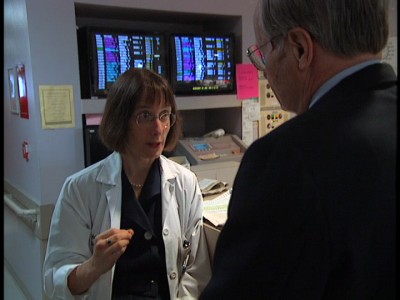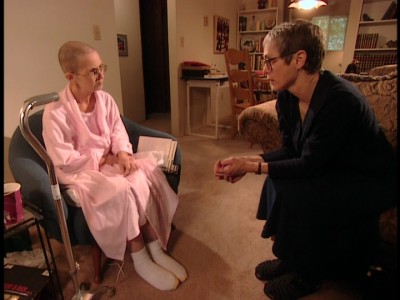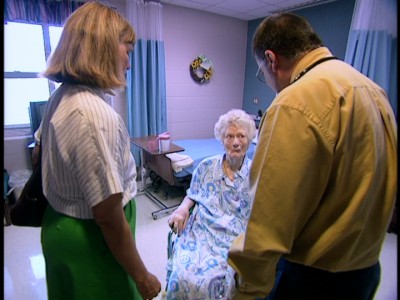| Reviews & Columns |
|
Reviews DVD TV on DVD Blu-ray 4K UHD International DVDs In Theaters Reviews by Studio Video Games Features Collector Series DVDs Easter Egg Database Interviews DVD Talk Radio Feature Articles Columns Anime Talk DVD Savant Horror DVDs The M.O.D. Squad Art House HD Talk Silent DVD
|
DVD Talk Forum |
|
|
| Resources |
|
DVD Price Search Customer Service #'s RCE Info Links |
|
Columns
|
|
|
Bill Moyers: On Our Own Terms

What better presence than that of the calm, intelligent, always polite, and respectfully inquisitive Bill Moyers to guide us through those sticky, controversial, not-at -the-dinner-table topics? Whether he's reasonably examining the influence of the Christian church on American politics or making the case for a profoundly pluralistic approach to religious faith, he's always a breath of fresh air, especially in the context of our ever more combative, sensationalistic, and shouty "news" media. With On Our Own Terms, which was originally broadcast on PBS in 2000, Moyers takes a long, deep, and detailed look at a matter that affects each and every one of us more equally, universally, and inevitably than virtually any other: death and dying.
Each of the program's four 90-minute parts addresses a different aspect of dying in America, with Moyers's investigation reaching far and wide across the land in order to document a broad range of individual stories that exemplify the complex issues surrounding the very fraught transition from living to dying, which is often an occasion for high-running emotions on the part of both the one who's dying and those close to them, which Moyers carefully avoids simplifying or short-changing. Part 1, "Living with Dying", focuses on how one might respond to a terminal diagnosis that could leave you living for months or even years with the knowledge of your own impending death, with varying (but usually deteriorating) degrees of quality of life in the meantime. This is the challenge faced by the episode's principal subjects, Missouri residents Bill Bartholemy (a pediatrician) and his wife, Pam, after Bartholemy is diagnosed with terminal lung cancer. The Bartholemys' day-to-day experience of decision-making, increasingly demanding care for the patient as he declines, and the shift in perspective on life that comes with the immediate awareness of death are intercut with the observations and thoughts of professionals like Miami psychiatrist Carlos Sandoval and Michigan undertaker Thomas Lynch on the cultural attitudes, personal beliefs, and social/historical realities (such as the particularities of the African-American experience in the U.S., where blacks have long been discriminated against in the health care system and are thus often very wary of it) that lead to different attitudes toward and expectations of death and the post-diagnosis period leading up to it.

Part 2, "A Different Kind of Care," deals with the thinking of the medical establishment when it comes to a patient's impending death, and asks the question, what does a doctor or nurse, trained to prioritize the saving of lives, do when faced with the impossibility of achieving that goal for a terminally ill patient? Moyers interviews and follows along with the fascinating, extremely articulate Dr. Diane Meyers of New York's Mt. Sinai Hospital as she explains to us, her sometimes resistant or clueless colleagues, and her patients the concept of comfort (or "palliative") care--the intricate gauging and addressing of a patient's physical pain and mental anguish as he or she dies, which often leads to removing life-prolonging measures and/or hastening a patient's death by giving them enough pain-relieving medication to truly mitigate their disease (as dramatized so movingly in Magnolia). In perhaps the series's most emotionally affecting sequences, Meyers's colleague Sean Morrison guides the palliative care of patient Joyce Kerr, a stage IV cancer sufferer who has decided to abandon chemotherapy and other treatments that have proven ineffective, reassuring and consoling Kerr and her family as they make difficult decisions that sometimes require them to weigh their mother/wife's physical and emotional comfort against her presence of mind.
In part 3, "A Death of One's Own,", Moyers opens by decrying the media coverage of the controversial, pro-euthanasia Dr. Jack Kevorkian by calling the media coverage of him and his opponents "simplistic," and proceeds to delve into the ethically very complicated idea of a patient's or physician's active ending of life as a way of deciding when enough pain (or ongoing intoxication due to pain-relieving medication) is enough. Moyers follows and contrasts the stories of two patients and healthcare teams from different regions/cultures of the U.S.--a woman dying of cancer in Portland, Oregon (the first state to pass a death with dignity law decriminalizing physician-assisted suicide for terminally ill patients) and a man with Lou Gehrig's disease in Bible-Belt rural Louisiana--as they attempt to decide for themselves at what point staying alive will, for them, no longer be actually living life but instead an unnecessary prolongation of their misery.

The fourth and final episode, "A Time to Change,", deals with the broken American healthcare infrastructure as it relates to patient's experiences of death by presenting us with the struggle of a physician--one Dr. Bailey, who runs the new hospice care service at a public hospital in Birmingham, Alabama, one of the nation's poorest and most underinsured regions--to make dying a comfortable process with some degree of choice and dignity for people who have little money, no health insurance, and other socioeconomic factors that impede their chance of passing away in reasonable comfort and with a decent level of care. Moyers closes out the series with an impassioned plea from interviewee Joanne Lynn--a physician who, as the head of The Center to Improve Care of the Dying in Washington, D.C., also advocates for allocating resources toward addressing the needs of dying citizens--to increase and re-prioritize health care resources in order to ensure the possibility of a comfortable, (financially) affordable death for all Americans.
The tone of the series as a whole is serene, rational, and actually quite comforting, despite its being a fairly sobering and sometimes difficult examination of something most of us do not really want to be reminded of or dwell upon at any length. Moyers's mission is not to rob death of its mystery--if anything, On Our Own Terms reinforces the idea that there are as many different meanings to and implications of death as there are people--but to diminish some of the intimidation and resultant denial and avoidance that can make the experience of dying more confusing and chaotic than it needs to be. As always, Moyers finds a way to inform us with measured reason and impeccably respectful compassion and humanity, even when the matter at hand is the solemn and unavoidable fact that we all will die one day.

THE DVD:
The transfer of On Our Own Terms, at the original broadcast aspect ratio of 4:3, is more than adequate to convey the circa-2000 digital video technology used to shoot the program, the visual quality of which looks as good here, if not better, than it did when it was initially shown on television.
Sound:The Dolby Digital 2.0 stereo soundtrack is simple but perfectly clear and free of any distortions, imbalances, tinniness, or other sound flaws; the sound here is easily sufficient to the mostly voice-over and dialogue needs of the show.
Extras:None on the discs themselves, but, as always, Athena Learning has supplemented their redistribution of Bill Moyers with a relevant and informative booklet (16 pages) that includes essays from both a reverend and a doctor on the process of dying; a concise and startling bar graph illustrating the many differences in statistics regarding death and dying between 1900 and 2000; a glossary of terms ("advance directive," "hospice," "palliative care," etc.); and remarkably thorough and objective thumbnail histories of hospice care and the physician-assisted suicide controversy.
FINAL THOUGHTS:Bill Moyers: On Our Own Terms takes a deep, hard look at a fact of life we spend most of it trying to avoid, but its expansive, thoroughgoing study of the way Americans die and how that might be improved is ultimately comforting. In addition to all the facts and illustrative individual experiences Moyers offers as informative food for thought, the series also honestly reassures by reminding us that there are many--from Moyers and his team to all of the conscientious and tireless professionals he introduces us to--concerned about and dedicated to making the process of dying, if not "better," at least less uncontrollable and painful and, most significantly and valuably, more understandable. Highly Recommended.
|
| Popular Reviews |
| Sponsored Links |
|
|
| Sponsored Links |
|
|
| Release List | Reviews | Shop | Newsletter | Forum | DVD Giveaways | Blu-Ray | Advertise |
|
Copyright 2024 DVDTalk.com All Rights Reserved. Legal Info, Privacy Policy, Terms of Use,
Manage Preferences,
Your Privacy Choices | |||||||













